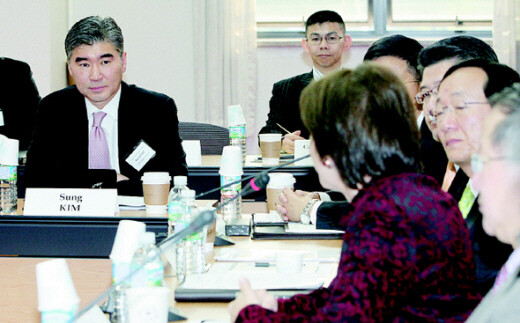hankyoreh
Links to other country sites 다른 나라 사이트 링크
Cheonan impasse shows signs of progress

By Yi Yong-in, Staff Writer
Signs have begun to emerge of a move toward overcoming the troubled political situation on the Korean Peninsula in the wake of the Cheonan‘s sinking. However, the prevailing view among observers is that speedy progress is unlikely with inter-Korean relations and the six-party talks, as both are linked directly and indirectly with a solution to the “Cheonan exit strategy” issue.
Meeting with journalists during a visit to China on Oct. 15, North Korean First Deputy Foreign Minister Kim Kye-kwan indicated his country’s intent to negotiate, saying, “We are prepared to execute the terms of the September 19 Joint Statement.”
In an article Saturday, the Choson Sinbo, the news organ of the General Association of Korean Residents in Japan, Chongryon, predicted a “conciliation offense” from North Korea, writing that “the advancement of North Korea-South Korea relations is something that Choson [North Korea] has always regarded as an essential task.”
Indeed, following its proposal for reunions of separated families, North Korea restored the North Korea-South Korea air traffic control communications network on Monday. Its efforts recall the “peace offensive” seen beginning in July 2009.
But with rather difficult conditions set by South Korea and the U.S., experts are predicting that a direct move into dialogue is unlikely. Given that Minister of Foreign Affairs and Trade Kim Sung-hwan, speaking at a ministerial hearing on Oct. 7, presented the terms of “a return of the International Atomic Energy Agency (IAEA) inspection team and a moratorium on nuclear facilities,” Kim Kye-kwan‘s statement falls well short of the demands of South Korea and the United States.
On the “Cheonan solution,” the key to advancing inter-Korean relations, matters reportedly remain unresolved even within the South Korean government. Hardliners on North Korea within the government have steadfastly maintained that advancement is impossible without an apology from North Korea for the Cheonan incident. In contrast, moderates have expressed the view that it is realistically impossible to expect a complete apology from North Korea, which has thus far denied its involvement in the sinking, and that it would be better to instead demand a suitable expression of regret from North Korea or detour the entire matter through an inter-Korean summit.
Meanwhile, the Red Cross organizations of North Korea and South Korea met at Kaesong in North to exchange the list of surviving members of separated families from each country. 133 separated members living in the South Korea and 112 living in North Korea are confirmed to be in good enough physical condition to attend the family reunions. 37 South Korean officials visited Mt. Kumgang to prepare for reunions schedule dto begin Oct. 30, the Unification Ministry reported Tuesday.
The Northeast Asia Cooperation Dialogue (NEACD) has taken place at the Institute of Foreign Affairs and National Security in Seoul’s Seocho neighborhood on Monday and Tuesday. In attendance have been authorities and experts from five of the six nations taking part in the six-party talks, namely South Korea, the United States, China, Japan, and Russia. North Korean representatives will not attend.
Please direct questions or comments to [englishhani@hani.co.kr]
Editorial・opinion
![[Column] Season 2 of special prosecutor probe may be coming to Korea soon [Column] Season 2 of special prosecutor probe may be coming to Korea soon](https://flexible.img.hani.co.kr/flexible/normal/500/300/imgdb/original/2024/0426/3317141030699447.jpg) [Column] Season 2 of special prosecutor probe may be coming to Korea soon
[Column] Season 2 of special prosecutor probe may be coming to Korea soon![[Column] Park Geun-hye déjà vu in Yoon Suk-yeol [Column] Park Geun-hye déjà vu in Yoon Suk-yeol](https://flexible.img.hani.co.kr/flexible/normal/500/300/imgdb/original/2024/0424/651713945113788.jpg) [Column] Park Geun-hye déjà vu in Yoon Suk-yeol
[Column] Park Geun-hye déjà vu in Yoon Suk-yeol- [Editorial] New weight of N. Korea’s nuclear threats makes dialogue all the more urgent
- [Guest essay] The real reason Korea’s new right wants to dub Rhee a founding father
- [Column] ‘Choson’: Is it time we start referring to N. Korea in its own terms?
- [Editorial] Japan’s rewriting of history with Korea has gone too far
- [Column] The president’s questionable capacity for dialogue
- [Column] Are chaebol firms just pizza pies for families to divvy up as they please?
- [Column] Has Korea, too, crossed the Rubicon on China?
- [Correspondent’s column] In Japan’s alliance with US, echoes of its past alliances with UK
Most viewed articles
- 1[Column] Season 2 of special prosecutor probe may be coming to Korea soon
- 2‘We must say no’: Seoul defense chief on Korean, USFK involvement in hypothetical Taiwan crisis
- 3Is N. Korea threatening to test nukes in response to possible new US-led sanctions body?
- 4No good, very bad game for Korea puts it out of Olympics for first time since 1988
- 5Is Japan about to snatch control of Line messenger from Korea’s Naver?
- 6Division commander ordered troops to enter raging flood waters before Marine died, survivor says
- 7Korea’s 1.3% growth in Q1 signals ‘textbook’ return to growth, says government
- 8N. Korean delegation’s trip to Iran shows how Pyongyang is leveraging ties with Moscow
- 9[Editorial] Korea’s surprise Q1 growth requires objective assessment, not blind fanfare
- 10[Editorial] Government needs to stop impeding Sewol mourning